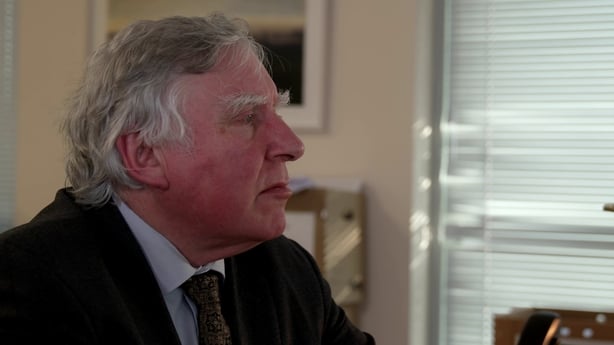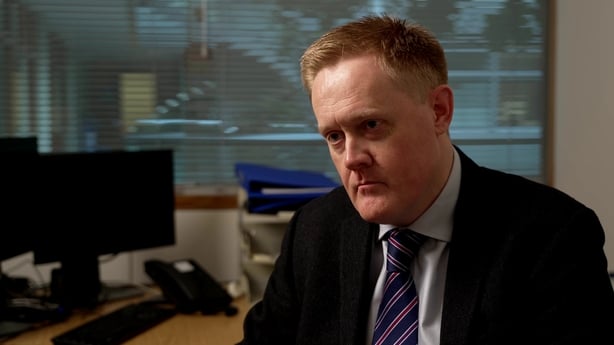In February 2014, CEO of the Rehab Group Angela Kerins was called in front of the Public Accounts Committee (PAC) to field questions over services provided by Rehab under contract from the State.
What followed became the focal point of a high-profile political and legal dispute that raised significant questions about parliamentary oversight and individual rights.
Within weeks, Ms Kerins had resigned her position with the Rehab Group. She eventually opened legal proceedings about her treatment by the committee.
The Supreme Court ultimately ruled that the PAC had acted unlawfully in its treatment of Ms Kerins, a decision that continues to have implications for the relationship between Oireachtas committees and those who appear before them.
In her first interview, Ms Kerins, spoke to Prime Time's Miriam O’Callaghan to say she is still seeking justice from the Oireachtas.
"It destroyed my career. It destroyed my health. I have a lot of complex PTSD over it," Ms Kerins said.
Eleven years on from her first appearance in front of the PAC, she is reflecting on a period of her life which she says nearly "destroyed" her.
Her appearance at the PAC came during a time when there was much scrutiny of the pay of executives working in the charity sector, or working for organisations in receipt of public funds.
Headlines questioned why senior figures in such organisations were earning six-figure salaries while the country faced austerity following the 2008 global financial crisis and the bank bailout in 2011.
The Rehab Group, which received substantial State funding, soon found itself under the spotlight.
As part of austerity measures introduced by the Government in July 2013, pay reductions for high-earning public servants aimed at making significant savings on the public service pay bill were introduced.
Organisations providing social and charitable services like Rehab were soon asked if they were implementing similar measures. Scrutiny intensified, with growing demands for transparency and accountability.
Then a report in the Irish Independent in October 2013 detailing the salaries of Ireland’s highest-paid charity executives listed Ms Kerins as the highest earner, with her most-recently-disclosed salary at €234,000.
That drew significant public and media attention. Three months later, while on a business trip to Saudi Arabia, Ms Kerins was interviewed on Morning Ireland.
She declined to disclose her current salary, despite running an organisation in receipt of about €80m in State monies at the time, a decision that significantly heightened media and public interest.
Ms Kerins maintained that, unlike other charities, the Rehab Group generated more than 60% of its income from commercial activities, with the remaining 40% coming from not-for-profit sources, including the sale of scratch cards.
Reflecting on the interview now, Ms Kerins says she did not disclose the figure because she did not have approval from her board to do so.
"My salary was confidential. I hadn't gotten any agreement at that time from the board to be releasing any information."
A month later, in February 2014, following sustained scrutiny, the Rehab Group revealed that Ms Kerins' annual salary was €240,000, an increase of €6,000 on the figure reported in the Irish Independent.
Public Accounts Committee
Amid all that media coverage and scrutiny, the PAC extended a formal invitation to Ms Kerins and a number of her Rehab Group colleagues.
"A letter came from PAC inviting us in. It was voluntary. They were inviting us in to discuss our services, in that the State paid for it. And to be very honest with you, we were very proud of those services," Ms Kerins said.
The process was set in motion, eventually leading to Ms Kerins' making an attempt on her life and culminating in a Supreme Court ruling on her treatment by the PAC.
Looking back on the experience 11 years later, Ms Kerins describes feeling "trapped," at the PAC, during what she saw as a one-sided interrogation.
"You have no ability whatsoever to defend yourself. There was no equality of exchange of information. We went, came in to give them as much information as possible so they could see what was being provided for the fees [paid to Rehab by the State]," she said.
"We sat there and realised these people are not interested in what we thought we were going in to do. They're only interested in creating some form of headlines and smoke and mirrors," Ms Kerins said.
Prior to the appearance, legal representatives sought clarification on behalf of Rehab as to the nature of the questions they would face in front of the committee.
It was confirmed that they were invited to address questions regarding HSE payments to Rehab for services, the operation of a lottery scheme, and funding from the Department of Justice and SOLAS training programmes.
After proceedings began, PAC members focused on Ms Kerins' recently disclosed salary and its €6,000 increase.
She faced persistent and often repetitive questioning, particularly regarding her salary and company car.
Some of these inquiries were later found by the Supreme Court to have extended beyond the committee's stated remit.
Ms Kerins’ counsel, John Rogers SC, says Mrs Kerins "went in there on a stated basis and all sorts of stuff was brought up with her, which was entirely irrelevant to the business of Rehab where she was CEO," Mr Rogers said.
"A citizen had gone into a Dáil committee and ended up being asked questions about things that didn’t matter at all to the terms of reference. So, what somebody like me would say, a citizen wasn't safe going in there," he added.

Bullying
One member of the PAC during that period was the now-former Fine Gael TD Eoghan Murphy. He has recently released a memoir documenting some of his recollections from Ms Kerins’ appearance, parts of which he said amounted to "bullying."
"Our investigations in the charity sector had suddenly caught the media spotlight... slowly and surely, the committee lost the run of itself, questioning became bullying," Mr Murphy wrote in his book Running From Office, released in 2024.
Ireland editor at the Irish Independent, Fionnán Sheehan, agrees that some of what the PAC subjected Ms Kerins to "went too far," despite it also being responsible for a lot of good work too.
"There's never really been an acknowledgement of that. And that's why I think there is this still this lingering perception. 'Oh, well, you know, she appeared before the Public Accounts Committee. They put all these questions to her, therefore there must have been an issue there,’" Mr Sheehan said.

The stress of her appearance at the PAC and the fallout that followed became overwhelming for Ms Kerins in the aftermath.
In March 2014, while at a meeting in her home to discuss the possibility of resigning to stem ongoing criticism, Ms Kerins learned that the PAC had referred allegations against senior Rehab figures to An Garda Síochána.
Gardaí investigated the allegations, but no further action was taken.
"I asked my colleagues to leave, and just give me time. I decided that to stop this, the resignation wasn't going to stop this. I kind of became very irrational and I decided I'd take my life, and I'd give them such a shock that it would stop it for everybody."
Thankfully for Ms Kerins, a colleague had recognised that something was wrong and returned to her home and gained access before contacting an ambulance which then took her to hospital.
'Rights trampled on’
While Ms Kerins’ recovered, she also began to pursue legal action against the PAC following her resignation from her role at Rehab for the way in which she was treated.
Initially, the High Court ruled against her in 2017, stating that while she had been treated harshly, the courts could not intervene in parliamentary proceedings due to parliamentary privilege.
She appealed to the Supreme Court seeking compensation. In 2019, the court ruled in her favour but stated that it lacked the constitutional authority to order compensation.
The Supreme Court found that the PAC had acted unlawfully by subjecting Ms Kerins to questioning that went beyond the scope of its terms of reference.
Chief Justice Frank Clarke stated that the committee had conducted a public hearing that significantly exceeded the invitation originally issued to Kerins, and that its approach was inappropriate for a parliamentary committee.
The court could not grant her compensation or an apology — only the Oireachtas could provide a remedy. She continues to seek this remedy.
The then-Ceann Comhairle, Seán Ó Fearghaíl, apologised to Ms Kerins in 2019, but within days he issued a clarification stating that he had done so in a personal capacity and was not speaking on behalf of the Dáil.
Despite the Supreme Court ruling and personal apology, Ms Kerins’ battle for what she sees as justice continues.
"The Oireachtas itself has to provide a remedy for me," she said, "I’m now having to go back to my abusers for justice."
If you have been affected by the issues raised in this story you can speak to someone by contacting one of the numbers at rte.ie/ie/helplines.
Miriam O’Callaghan’s interview with Angela Kerins, which is produced by Sallyanne Godson, is broadcast on the 11 February edition of Prime Time on RTÉ One and RTÉ Player.






